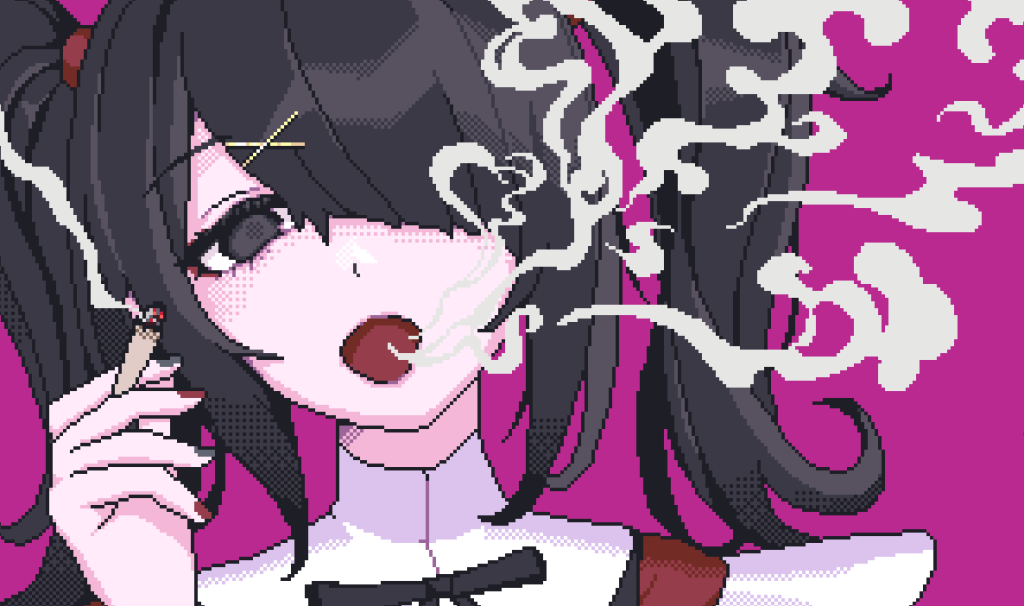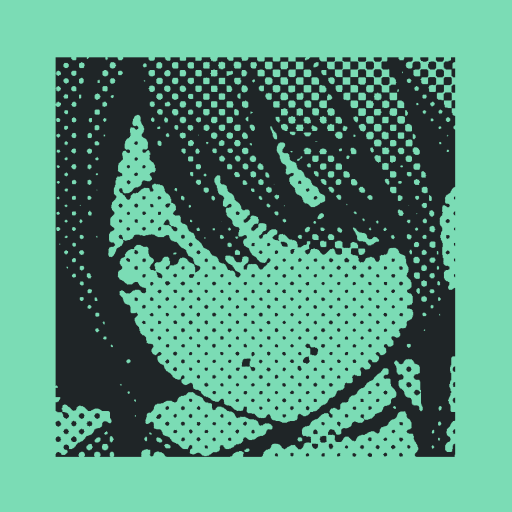There was an exaggerated angel who looked beautiful everywhere!
I concur. The crystalline shine of the plastic crinkles encasing an oversized full-graphic tee of Ruri Gokou could be perceived through purely etymological means of fashion. DEEP DARK FANTASIES pertaining to daydreams, figures—figuratively and veritably—and the thirst for annihilation through overdosing in the court of clout. It’s a race to the end of the world, and we’ve saved the perfect seat for you. Recline into the pastel embrace of oblivion, savoring the delicate, fragile sweetness of that soft pink jelly thing. Do be mindful, though, of the other guests—they lingered here far longer than you have.
Objects of desire laid bare, sullied by the elements of the world. Blunt, Closet Pervert, Curious, Food Lover, Friendly, Hard Worker, Kind, Loyal, Mischievous, Otaku, Outgoing, Serious, Sly, Watashi—these tags no longer fit their representation. Even the words themselves could be lost at the hands of linguistic fallacies. The stains of ideologies, cultures, and the self-ordained have landed a single speck of disorder in the heart of ideas. The war is invisible to the eepy, superflattened netizens of Cyberia, but we’ve already been there, and we’ve already done that.
The cornerstone of Kawaii (かわいそう) has been its connection to the weak and pitiful. Vaguely, or intensely related to the weakening nationalism of a post-postwar Japan, it is a guise into infantilism and adorability. Submissive and breedable symbols cannot arise concern. The common trope of a damsel-in-distress has borne countless self-fulfilling prophecies. A tragic love story between a good-faithed man and the eternally 17-year-old girl. Maidens in need of a proper release from their afflictions. Or, on a reasonably individualist scale, dating a girl who’s just a bit shy, that’s all.
Entertainment’s value lies in its ability to stimulate the senses, to escape into listless dreams. Art creates value solely in its invocation of moe and aesthetics to perpetuate a style-over-substance ethos. Yet, in pursuit of ephemeral perversion, art’s secondary action has flourished unconsciously. That is, a confrontation with hyperreality.
Needy Girl Overdose is a product of this condition. A hyper self-conscious/aware indulgence in the meta. From playing around with the role of the live streamer to more meta-actions such as ego surfing or analytical charts of clout. Needy Girl Overdose lies heavily in the realm of savior moe, but with a quaint difference.
Cynicism. The moe transforms itself into something else entirely, from the growing shift in identifications. Characters have been written with the reader in mind, to provide a safe space to express the otaku’s lofty ideals of love. Boy meets girl, or so it should have been.
The audiences begin to look from within to understand the characters. In a process of leveling, the viewer reads with a concept in mind, and evolves themselves by those means. The faceless main character can no longer represent the harmless idealism of the same otaku.
At its roots, otaku culture is harbored on the idealism of a utopia, a means to ignore one’s own mortality, to remain in endless childish dreams. It is to look at the symbols resembling nothing but themselves and taking them at face value. Honda Toru, an important figurehead within early otakudom (Existential Waifism), was well known for his concept of “Love Capitalism.” Perhaps too unabated in the grassroots of otaku identification, he proposed logic roughly related to the income gap. He believes, to rid oneself of this system, one must invest in hobbies and fictional relationships. To reach beyond and be something more.
The shift from then to now, is that this distinction, or even that ideation, holds very little bearing and creates an immediate paradox of ideals. To accept one thing as a fictitious existence is the ultimate folly. Surrendering yourself to something that is merely a representation of something that cannot exist, to realize the gods you followed were nothing more than something created by the hands of others creating their own objects of worship. A loss of faith, an edifice of sehnsucht. Passion fades, and everyone is insane.
So what’s the next step? What is our optimum solution?
You do the same thing. Where there was glistening hope and unadulterated love now remains a period of reflection. Confronting moe, a reflection of yourself. Confrontation by use of self-references through the already vastly developed otaku sphere. Stories about facilitating positive evolution and breaking free of intensely Japanese societal expectations (i.e. conformity, but don’t we all). This age of escapism spawns countless metanarratives about escaping the means of escapism itself. Thus, presenting the otaku lifestyle as something to grow out of, an indolence for busy adult children to make pretend with. But, in an act of pure cynicism, the symbols remain and daddy’s children glee in despair.
Instead, artists choose to present their ideas through the medium. Not against the ideas, or against the narratives that preceded them, but in congruence with its midsummer dream, for no better reason than because that’s all there is left (and you can’t tell me what to do).
It is cynicism through moetiplicity. Presenting the death of imagination and an extension of the real-life world, through both hyperidealized forms of understandability of what makes you, you. P-chan represents our savior, good for those still under the influence of the Kamisama’s righteous kingdom. Ame-chan/KAngel is the girl who needs our saving, obviously.
But aside from how the series attempts to prostrate itself, it’s apparent that it’s become much more than a self-fulfilling white knight fantasy. Deconstructing the ethos of popular streaming culture and the overwhelmingly powerful influence fame has on you is fine and dandy, but with most things, you could always twist narratives into something positive. Spending an absurd amount of money on a slot machine could be a humiliation ritual, or it’s a way to soothe your soul through indulgence, lest you ruin everything by not taking it as a lesson.
Originally, the game was written to express the creator’s thoughts and observations of popular internet culture. Expressed through a girl he himself shared a lot of sensibilities with. To include, drugs, therapy, hopelessness, and of course the eternal symbol, anime girls.
Through the early days of the franchise (suppose it’s appropriate to refer to it as such), it was an anomaly to understand. Was it supposed to be self-help? A cautionary tale? Or perhaps, it was a simple indulgence in the aforementioned otaku idealism? Twisted, split, contorted, cracked, and by all means, concentrated.

“To be honest, I bet I could be happy if I really tried But I can’t stop pretending like I’m not.“
It is more apparent to me what this was always going to express, the only thing it could ever possibly represent.
That is, a complete understanding of the elements that make up its contents. A forlorn interpretation of nostalgia’s deceptions. An inaction, and a perilous delight in swimming in shallow waters. Sudden passion and enthusiasm being forced into comical apathy, each of them almost indiscernible from the next. Representations that do little more than express superficial values—that it does not exist. A means to use reflection to imprison oneself through spoliation (like the forbidden fruit!), to understand the insurmountable odds against you, but of course, you can do anything. Or maybe you really can’t, and maybe it’s just you and me. She’s literally me. The cure is infinitely worse than the mental disease.
In reality, it’s a glorification of all of the life-negating forces it imagines. Don’t be mistaken, it’s a good thing! Cuz like, OMG, fragility is super moe! 🥺✨ Like, who doesn’t love a bit of cute vulnerability? 💖 #BwOwO #TooCute


Leave a Reply